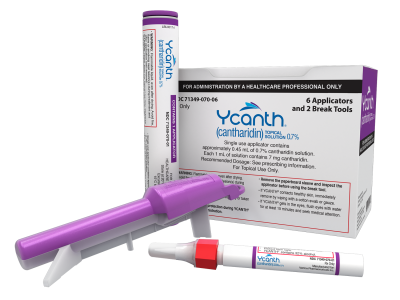This product information is intended only for residents of the United States.
For Healthcare Professionals:
The first FDA-approved treatment for molluscum contagiosum in patients 2 years of age and older.
YCANTH™️ receives permanent J-Code from the Centers for Medicare and Medicaid Services, read press release.
Please see Important Safety Information below.
Relevant Links
To learn more about molluscum, how to manage it, and the benefits of treating it, visit: www.aboutmolluscum.com
For patient resources, visit: YCANTH.com
For healthcare professionals resources, visit: YCANTHPro.com
Verrica Patient Assistance Program
The Verrica Patient Assistance Program can help eligible patients with out of pocket costs for YCANTH. Check eligibility requirements.
Indication
YCANTH (cantharidin) topical solution, 0.7% is indicated for the topical treatment of molluscum contagiosum in adult and pediatric patients 2 years of age and older.
Important Safety Information
CONTRAINDICATIONS:
None.
WARNINGS AND PRECAUTIONS:
ADVERSE REACTIONS:
The most common (incidence ≥1%) reactions are the following local skin reactions at the application site: vesiculation, pain, pruritus, scabbing, erythema, discoloration, application site dryness, edema, and erosion. Local skin reactions at the application site were observed in 97% of subjects treated with YCANTH during clinical trials. These local skin reactions are expected and related to the anticipated blistering response of the skin to cantharidin.
DRUG INTERACTIONS:
No studies evaluating the drug interaction potential of cantharidin have been conducted.
USE IN SPECIFIC POPULATIONS:
Pregnancy: There are no available data with use of YCANTH in pregnant women to evaluate for a drug-associated risk of major birth defects, miscarriage or adverse maternal or fetal outcomes. Given that systemic exposure to cantharidin following topical administration is low, maternal use is not expected to result in fetal exposure to the drug. Lactation: Avoid application of YCANTH topical solution to areas with increased risk for potential ingestion by or ocular exposure to the breastfeeding child.
OVERDOSAGE:
Oral ingestion of cantharidin has resulted in renal failure, blistering and severe damage to the gastrointestinal tract, coagulopathy, seizures, and flaccid paralysis.
Please see full Prescribing Information
To report SUSPECTED ADVERSE REACTIONS, contact Verrica Pharmaceuticals Inc. at 1-877-VERRICA (1-877-837-7422), or FDA at 1-800-FDA-1088 or www.fda.gov/medwatch. Local skin reactions are expected and should be reported if they are severe.
Verrica Receives Permanent J‑Code for YCANTH™

Please see Important Safety Information and full Prescribing Information